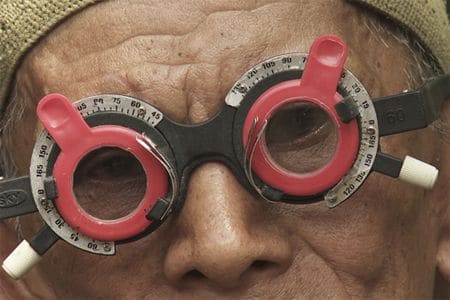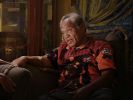Eye For Film >> Movies >> The Look Of Silence (2014) Film Review
The Look Of Silence
Reviewed by: Owen Van Spall

The poster for Joshua Oppenheimer’s documentary The Look Of Silence uses the striking image of an Indonesian man staring out at the viewer from behind a pair of optometrist eye-test goggles. A strange, but appropriate visual metaphor, given that this is a film concerned deeply with seeing and looking, with the act of trying to move others to face what they wish to avoid, and with showing sympathy for those who cannot stop looking back. As with The Act Of Killing (2012), to which this films acts as a companion piece, Joshua Oppenheimer is once again concerned with unearthing the trauma of the Indonesian genocide of the 1960s, but this time with the focus moved to the victims and living relatives.
The Look Of Silence grew out of Oppenheimer’s years of research into those terrible years in Indonesia, when he encountered through his investigation a family who’s eldest son had been killed by militias, one of the estimated one million victims who were accused of being ‘communist insurgents’ or some such nonsense, and dealt with summarily. The surviving son, Adi, worked with Oppenheimer in pursuing, through the material the director had gathered, the men whom he believed might have been responsible for his brother Ramli’s vicious murder. Adi was born in 1968, two years after his brother Ramli died. Whereas in The Act Of Killing we the viewers had to endure the grisly sight of militia gangsters boasting of their government-approved kills, here there is even less possibility of abstracting the impact of this away, as we see Adi himself watching Oppenheimer’s video footage of his interviews with the very men who admit to slaughtering Ramli and so many others. Again and again Oppenheimer keeps the camera on the silent Adi in tight, unmoving close up. What he must be thinking defies the imagination.

As befits a story about a crime whose impact spans generations, Oppenheimer devotes a lot of time to Adi’s relationship to his extremely old parents (they claim to be over 100). It is through Adi’s cantankerous, proud and sharp-witted mother that we hear the horrific story of Ramli’s death, he survived an initial torture session only to somehow find the energy to stumble home, where his mother was forced to watch him being seized once again by local militias the next day. For all her composure, Adi’s mother, almost casually, announces she hopes the children of her son’s killers suffer one day. Whether she means suffer with the knowledge of their father’s crimes, or something worse, is left unsaid. The close-in, sharp cinematography emphasises the weathered nature of her skin, like she is a map of pain, a living history book. Ari’s father is an even more tragic figure, as the filming coincided with his final stages of dementia: he can no longer remember his son, and thus there will be no closure.
Adi’s travels with his optometrist kit - for that is his occupation - form the structure of most of the film, and forms part of what Oppenheimer has called his attempt to “break the silence born of terror”. Several of Adi’s patients were high level operatives in the killing militias, and he confronts them over their involvement in several filmed encounters. Though the responses vary from demands that "the past should be forgotten" (an almost universal response) to shockingly straight-faced descriptions of brutal acts of killing, no one really claims “responsibility” in the way that viewers with a moral compass would find satisfying.
Most repeat the propaganda that the country was on the verge of being overrun by communists, and their grisly fate is presented as logical and inevitable. Oppenheimer contextualises this by showing us what seems to be a typical history lesson for junior school children in the present day, with the teacher repeating almost verbatim the absurd descriptions of communist crimes, which, of course, justified only the harshest reprisals. This is part of what fuels what Oppenheimer has called a "national psychosis", one which seems to have driven the killers into such a frenzy that many admit to having drunk the blood of their enemies.
Oppenheimer has described this image of Indonesia as like looking at a warped version of modern Germany where the Nazis won somehow, and then stayed in power. One of Adi’s interview subjects is in fact a high level minister who was a military leader, confirming the depressing reality that this mass national omertà is state sanctioned, and some of the killers still remain in positions of influence. Adi’s bravery is made all the more impressive, and the risks he is running are made more concrete, when this minister remarks in a deceptively friendly tone that the past is best left alone in case it results in the killings starting again. And so, the threat of reprisals remain clear for those who start digging around. A glimmer of hope emerges when Adi’s hears the daughter of one of the militia bosses express horror at having heard, for the first time, the true story of his exploits. She begs Adi to forgive her now-senile father.
Though it lacks the formal inventiveness of Oppenheimer’s previous film (where a series of high level killers were invited to re-enact their murders in from of the camera, often with gusto) this is still a haunting and powerful piece of work that, with its altered focus, complements The Act of Killing as opposed to feeling like a simple extended edition of that film. The subject matter alone is fascinating, but Oppenheimer is also a director with an eye for a striking tableaux to match, whether is a truck’s lights cutting through a misty night, or insects dancing on Adi’s mothers hands. Much of the screen time outside of the interviews is given to lingering sequences of various individuals in a contemplative poise, which feels right, given that in the absence of any kind of restorative justice, leaves the victims and their families nothing left but to sit, still, and remember.
Reviewed on: 06 Jun 2015

















